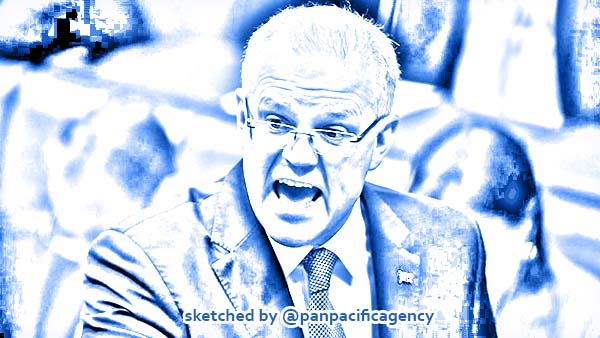Australia to slow down return of citizens abroad: PM

Prime Minister Scott Morrison has recorded a video which sends a strong message to people smugglers about Australia's zero tolerance policy to illegal boats. (AAP). Sketched by the Pan Pacific Agency.
SYDNEY, Jul 8, 2020, Reuters/AFP. Australia will likely slow down the return of its citizens from abroad, Prime Minister Scott Morrison said on Wednesday, as it grapples with a fresh outbreak of the coronavirus that has led it to isolate its second most populous state, Japan Today reported.
The border between Victoria and New South Wales, the busiest in the country, was closed overnight and around 4.9 million residents in the Victorian capital of Melbourne will return to partial lockdown at midnight following a spike in COVID-19 cases in the city.
“The rest of the country knows that the sacrifice that you’re going through right now is not just for you and your own family, but it’s for the broader Australian community,” Morrison said during a televised media conference.
“I can imagine the frustration … we don’t have control over the virus as such, but we do have control over how we respond.”
With the Victoria shutdown putting pressure on other states, Morrison said he would take a proposal on Friday to the national cabinet created to deal with the pandemic, seeking to slow down the return of Australian citizens and permanent residents by reducing the number of repatriation flights. The two groups have been the only arrivals allowed since Australia closed its international border in March.
Neighboring New Zealand has already taken that step, announcing on Tuesday that its national airline will not take new inbound bookings for three weeks to reduce the burden on overflowing quarantine facilities.
There has been growing public concern in Australia about security lapses that have led to returnees spreading the virus, despite undertaking quarantine on arrival. Local media reported security guards had breached infection control protocols — including allegedly having sex with guests being held in isolation — prompting the government to replace the private contractors with prison staff and launch an inquiry.
The state reported 134 new infections in the 24 hours to Wednesday morning, down from the previous day’s record 191 but well over the low single digit daily increases of the other states and territories.
Of the new cases, 75 were occupants of nine public housing towers that were earlier this week placed under the country’s strictest lockdown so far. Around 3,000 residents have been banned from leaving the buildings, which are under police guard, for five days. All residents are being tested for COVID-19.
At the border with NSW, cars banked up on both sides as police checkpoints caused delays of more than an hour for drivers. The state line is heavily trafficked by daily commuters who live and work on either side.
“I got a permit but with all the checks, my commute across was heavily delayed,” Amanda Cohn, who crosses the border from her home in NSW each day to reach the Victorian hospital where she works, told Reuters by telephone. “Plenty of others need to get across and they don’t have a permit.”
Authorities had hastily set up a system to issue travel permits for a select group, mostly commuters in border towns, but a website created to dispense passes crashed soon after its launch on Tuesday evening with officials saying more than 44,000 people applied. Officials reassured that regular commuters could instead show residential and employment documentation.
Victoria’s only other internal border, with South Australia, has been closed since mid-March.
Panic buying in Melbourne
In Melbourne, restaurants and cafes will be limited to serving takeaway food, while gyms, beauty salons and cinemas will be forced to close again for six weeks.
Residents will be restricted to their homes except for work, exercise, medical care or to buy essentials — a return to social isolation that was only recently lifted.
Shoppers stripped supermarket shelves Wednesday. The country’s largest supermarket chain, Woolworths, said it had reimposed buying limits on items including pasta, vegetables and sugar after shoppers rushed to stores across Victoria state.
Experts have warned that people everywhere will have to get used to the “new normal” of on-and-off restrictions as new clusters emerge and subside, while there are also concerns over the economic and health impacts the measures will bring.
Treasurer Josh Frydenberg said the Melbourne lockdown would cost the economy up to $1 billion ($700 million) a week, telling public broadcaster ABC the burden would “fall heavily on businesses”.
Professor Michael Kyrios, a clinical psychologist at Flinders University, warned that Victoria needed to brace for a “coming mental health crisis” as a result.
“This will likely place the mental health care system in a precarious situation with very limited ability to mobilize resources in response to the increased incidence of mental illness arising from the COVID crisis,” he said.
State Premier Daniel Andrews on Wednesday acknowledged the costs to Victoria’s 6.6 million residents, saying his job required him “to make not just the popular calls, but the really difficult, the hard calls”.
“This is not the situation that anybody wanted to be in but it is the reality that we must confront,” he said. “To do otherwise is to pretend that this isn’t real, to pretend that we have other options.”
Nationwide, Australia has reported about 9,000 COVID-19 cases and 106 deaths from the virus.